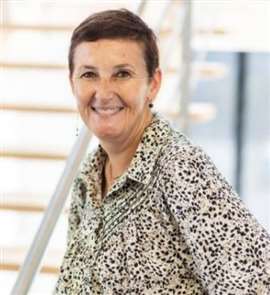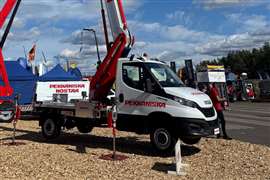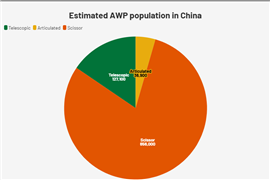Kiloutou chief “anxious” about global ESG roll-back
30 April 2025
As the chief executive of France’s second largest equipment rental firm who has made it one of his key missions to reduce carbon emissions in the construction sector, Olivier Colleau says Donald Trump’s push-back on climate policies in the US and overseas is making him “anxious.” He tells Lucy Barnard how he plans to build the CAMD not-for-profit organisation aimed at decarbonising construction equipment, despite the risk of a global ESG roll-back.
 Olivier Colleau. Photo: Manuel Lagos Cid/Kiloutou
Olivier Colleau. Photo: Manuel Lagos Cid/Kiloutou
“I’m not going to make a political comment,” says Olivier Colleau, chief executive of Kiloutou, choosing his words carefully, “but it’s a real pity to see such a complete shift in political direction regarding sustainability.”
As the leader of France’s second largest equipment rental firm, and one who has made reducing carbon emissions a key mission by helping establish a coalition of firms committed to the energy transition, Colleau is worried that 2025 could be the year it all starts to unravel.
“It’s a fact that if I compare the situation we have today and the situation we had two or three years ago, we are not living in the same world,” says Colleau. “Two or three years ago there were positive gains towards decarbonisation and ESG. It’s clear that now it seems to go the other way.”
ESG corporate roll-back?
The reason for all of this of course is a global rethink on climate commitments from some national governments and corporates following the new policies being promoted by US president Donald Trump.
Kiloutou was the prime mover in the creation of the Communauté des Acteurs du Matériel Durable (CAMD) - a lose translation might be ‘Community of sustainable equipment companies’ - the not-for-profit organisation of rental firms, manufacturers and contractors committed to finding a way to speed up the adoption of more sustainable construction equipment.

Colleau, who is also president of CAMD, says he fears that the new US administation’s policies could prompt members of the organisation to pull back from their own commitments towards producing, buying and renting zero-emissions machinery.
“I’m monitoring this because I’m quite anxious about it,” he says. “It’s probably a good way to see which are the companies that really are committed to reducing their carbon footprint and behaving sustainably, and which are the companies that just did this because it was shiny, or it was a question of fashion.”
So far, however, Colleau says, as far as he is aware, no cracks have started to appear in the CAMD alliance, and the group has grown from a small meeting of rental firms, OEMs and contractors back in 2021 to a not-for-profit organisation with a legal identity and 17 fully paid up members today.
What is CAMD?
The group was legally established last April by rental firms Kiloutou and Salti; OEMs Manitou, Haulotte, Volvo CE and JCB; and contractors Bouygues Construction, Eiffage, Colas and NGE. Over the last twelve months they have been joined by seven more firms which have each committed to paying the €6,000 annual subscription and to abide by its rules. These are Atlas Copco, Bergerat Monnoyeur, Acces Industrie, Wacker Neuson, Equans, Yanmar and Total Energies.
In March this year CAMD appointed Audrey Miclard, Kiloutou’s sustainable development director, as its corporate secretary to structure and lead the association and coordinate its working groups. And on 27 May it plans to hold its largest annual conference yet, involving participants from its 17 members as well as representatives from across the industry.
 Audrey Miclard
Audrey Miclard
“We started this four years ago now,” Collou says. “It was a meeting where we invited a number of companies along the value chain - OEMs, rental companies and also construction companies - to share knowledge and ideas about how to reduce carbon emissions.
“Four years ago, I said maybe it will be a failure,” he adds. “When I said to people, OK, we’ll just come together and discuss sustainable matters, I thought maybe I would have been alone. But it has not been the case, and the first success is really that our community exists.”
“We made the decision last year to move from an event organised by Kiloutou to an association with a legal existence to be sure that we are fully neutral when we have any discussion with third parties.”
Some of the key objectives of CAMD, says Colleau, are to foster a shared vision and ambition for decarbonising the industry and to find practical solutions to the technical challenges involved.
“So this is an area where we have people who are usually competitors and here, they actually share ideas,” says Colleau. “Obviously, we have all very strict rules we are not discussing prices or tenders or contracts - but we are sharing the way we think in terms of strategic directions with the energy transition.
“There are so many topics that we want to address in this community,” he says. “We want to address our current understanding of the technology which exists. So what about electric? But what about hydrogen? What about the alternatives? There are also a number of topics related to what does it mean in terms of organisation of on job sites? What does it mean to provide the energy on job sites? What does it mean for the workers? Do they need more training?”
One of the major obstacles at the moment to reducing industry-wide carbon emissions is the scarcity of battery-powered machinery.
Energy transition challenges
Currently, the group says, manufacturers only produce a small number of electric machines because they cannot be sure that rental companies will buy them. That low volume keeps purchase prices high. Rental companies, meanwhile, only buy a few electric machines because they cannot be sure that customers will rent the machines and because purchase prices remain far higher than diesel equivalents. And customers are often unwilling to rent emissions-free equipment because they are hard to get hold of, rental prices can be far higher than diesel machines.
To combat this, Colleau says, OEMs, rental firms and contractors must work together to establish more of a market for this type of machinery and to highlight how the lower costs of fuel for emissions-free machines brings down the total cost of using them in the long term for customers.
 Olivier Colleau (centre) with CAMD vice chairmen, Michel Denis, president and CEO of Manitou (right), and Patrick N’Kodia, director of transformation at Bouygues Construction (left)
Olivier Colleau (centre) with CAMD vice chairmen, Michel Denis, president and CEO of Manitou (right), and Patrick N’Kodia, director of transformation at Bouygues Construction (left)
“I will be honest, there is not one solution that we will find in one day. It’s going to be a long journey,” he says. “It’s a fact that low carbon equipment is more expensive. Electric machines are let’s say twice the price of conventional diesel and if we want to use it on the job site, the cost will be higher for the final end users.”
And yet, despite the participation of so many major companies in the French and European construction industries, it’s easy to see a few big names which are missing – most notably Kiloutou’s biggest rival and France’s largest rental company, Loxam. Does Colleau believe CAMD can reach critical mass without Loxam’s participation?
“I’m very proud to see so many decision makers sharing insights, taking part in in the working groups every year. It’s already a lot. And I would love to have more people, but I don’t specifically need one single additional company. I want companies to join us if they really want to take part. If they share our commitment,” Colleau says.
“Loxam Is taking part in the yearly event we organise. They have not decided to join the community but they are more than welcome.
“When you look at the all the members we have today, we have a good committee. We really have the main OEMs. We have big construction companies and we have a couple of good rental companies. So we already have a good committee. We can go even further, but I am very proud of the policy of the of the companies who decided to join forces with us.”
STAY CONNECTED



Receive the information you need when you need it through our world-leading magazines, newsletters and daily briefings.
CONNECT WITH THE TEAM












